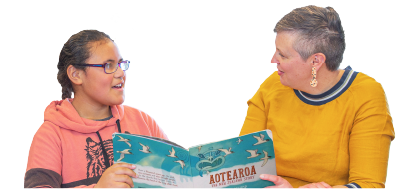Culturally located practice
Show video transcript
Title slide: Culturally located practice
Dr Ali Glasgow, Lecturer, Victoria University of Wellington, facing camera
I’m from an atoll where in a few, probably in a decade's time it will be underwater. So I won't be able to go back to my homeland, that will be here but that shouldn't be at the expense of knowing who I am. So it's ensuring that children are really strong in their language, their cultural understanding and their identity and sense of belonging to their culture is for me the really strong cultural pedagogy. Teachers need to, if that's a really important learning outcome or the best learning outcome, teachers need to make sure that what's taught in their classroom will meet that. I mean that's essentially what a culturally embedded located pedagogy for me is. That we have programmes that are delivered in their home language, that the practices reflect what they would be learning back home. So it might be they learn how to scrape the coconuts and they learn how to make you know, to weave the mats, because they’re skills that, if children don't learn at this age it's very hard to learn later on.
I think schools can work with Pacific families by actually rethinking some of the work that they do and really looking at... I mean I talk about sort of turning the tables and starting from another way of viewing what education is about and looking at what they think are valuable learning outcomes for their children. And I'm always compelled by the thought that children need…
Adults and children involved in weaving activities
Education shouldn't be about children losing their culture or their language or their identity. And so if that isn't happening within the classroom or in their educational setting, teachers really need to reflect on what they need to build into their programmes to ensure that children aren't losing that. I think a lot of our education up to now has been about children leaving a lot of their “who they are” at the door to be successful.
Dr Ali Glasgow, Lecturer, Victoria University of Wellington, facing camera
We're about the collective. Okay yes, the child is an individual and they have their interests but they're part of this group and we don't want them to move too far away from belonging in this group. So that sense of belonging is to this cultural group. So that's a slightly different way that we look in New Zealand, it’s about the child has agency and they're independent; I don't have a problem with that. But when they move too far away from who they are then they're lost. So that strong sense of connection and the relationships are more important.
And so bringing the family in and celebrating you know the skills that the family have, like your learning stories about fishing back in Niue, and how we went to get the coconuts from the plantation you know, how we grow pineapples and put the taro and...that stuff, they might be stories, but it's really important learning for us. And I don't see a lot of that happening in our schools.
This video is about culturally located and responsive practice, identity, and language, and recognising learners as individuals located within their cultures. In this video Ali Glasgow speaks about culturally located pedagogy; programmes that are delivered in the learner’s home language and reflect what learners would be learning in their homelands. Schools are challenged to learn what Pacific families consider to be valuable learning outcomes for their children and work from there. The video invites teachers to reflect on what they need to build into their programmes to ensure that Pacific learners will not lose their culture, language, or their identity.
Reflections for individual teachers
As you watch this video, think about the keys to educational success for Pacific learners.
- Think of ways to acknowledge that Pacific learners are culturally located and how effective education embraces culture. How do you enhance your Pacific learners’ sense of identity and belonging and encourage them to actively embrace their culture and language?
- How will you explore Pacific cultural knowledge, theories and values to support the development of culturally responsive theory and practice in your classroom?
- Think about how you can be more culturally responsive in your teaching. Reflect on your cultural knowledge and teaching as it relates to Pacific culture. How can you use your Pacific learners’ cultural knowledge and perspectives as a resource for teaching?
Reflections for staff or departments
If you are a staff member or member of a department team, think about how you can contribute to a school curriculum that supports Pacific learners to achieve educational success and retain their Pacific culture.
- Share your thoughts about
- why culturally responsive pedagogy is important
- how culture supports educational achievement
- the importance of teachers' attitudes and behaviour towards culturally diverse learners.
- How is your school creating a safe and supportive environment for staff to learn and grow relationships? What can your school do to connect with families and communities?

